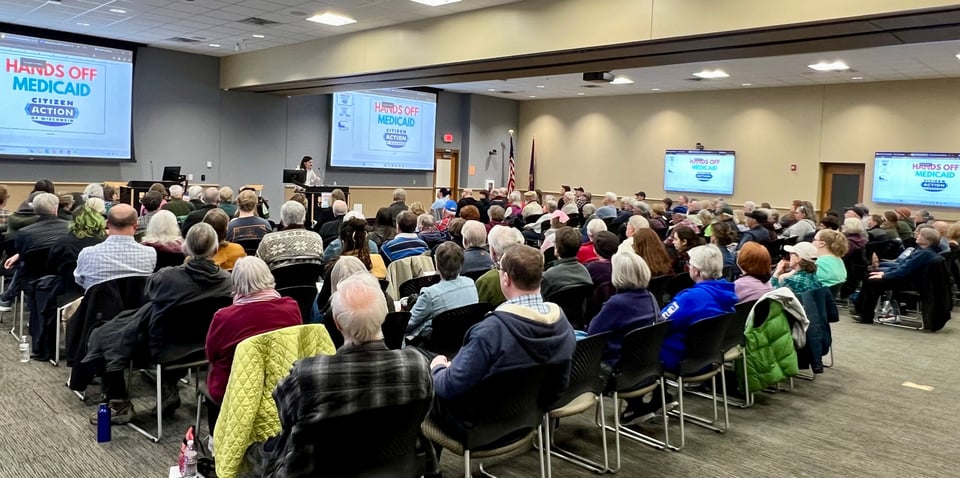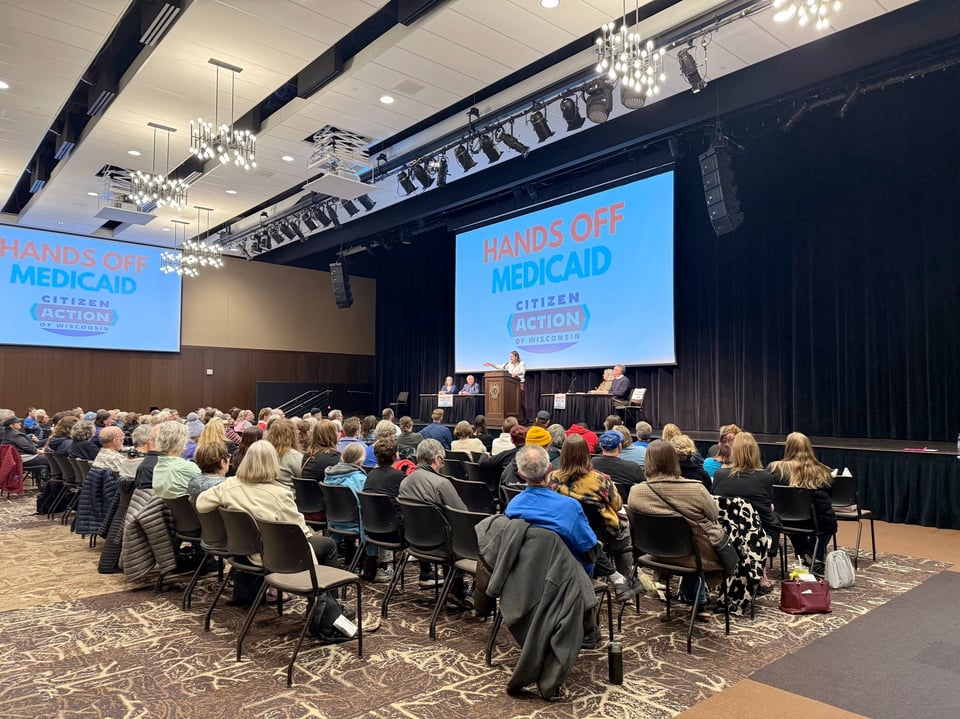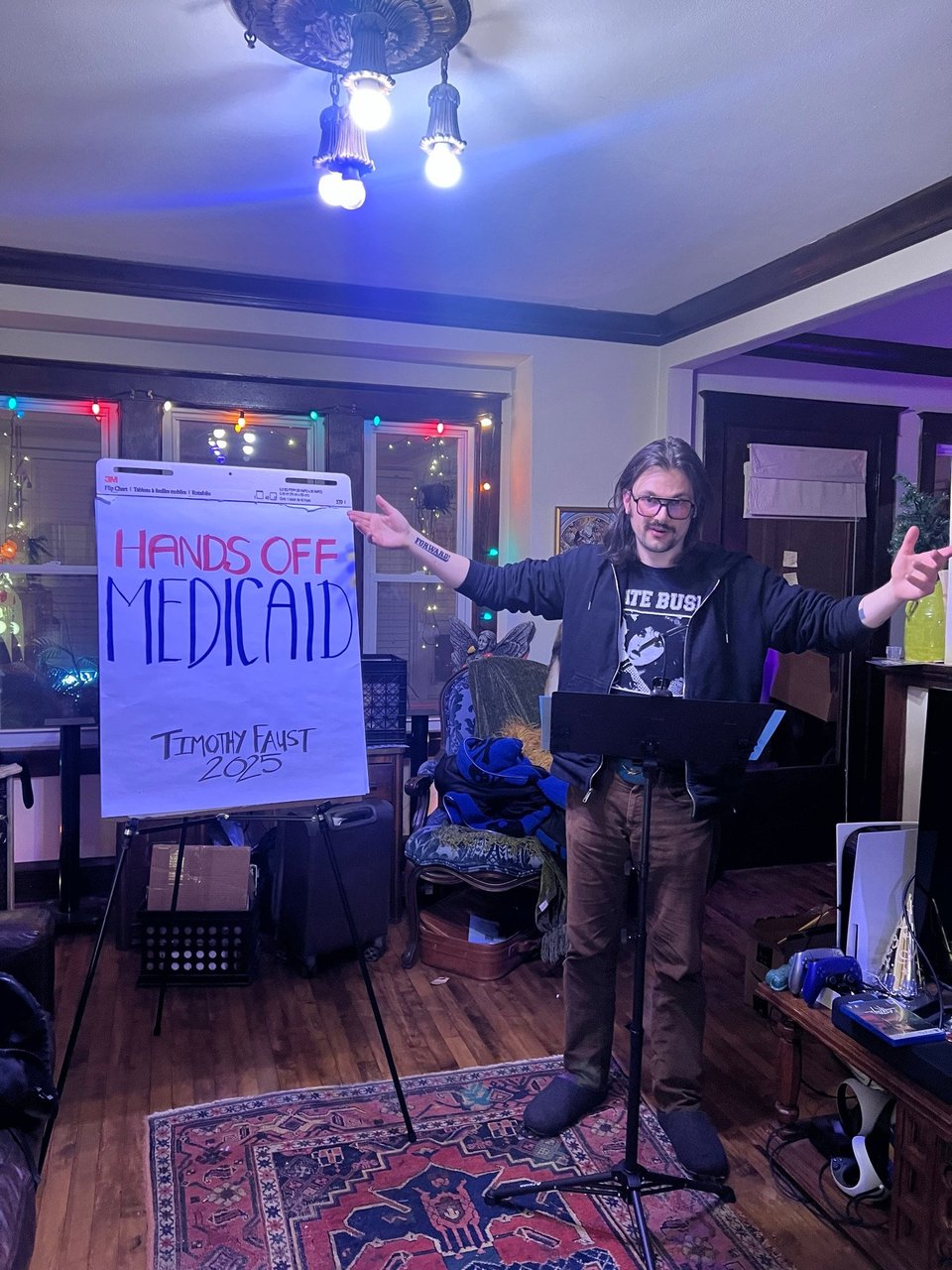On the road again
Blessings ‘pon the blesséd,
As always, been a minute since I rapped at you. In the months since, the Republicans have come for Medicaid, as we knew they would. Not knowing what else to do, I’ve followed my animal instincts and taken to the highway, and I’d like to share with you what I’ve been saying out there.
But a quick plug: if you want to host a Medicaid town hall like the one I describe in this letter, I will help you however I can. If you’d like, I can come out and speak at it. I have a few general guidelines for what the event should look like. Shoot me an e-lasso… electronic.
Also: After seven years away, I went on Chapo Trap House to talk about Medicaid and Medicaid town halls. I had a very good time and the boys were very gracious. If you want to hear most of what I’ve written below, frontloaded by fifteen minutes of my feelings about diet soda (it’s what’s keeping me “hanging on”!), click here.

Both with my job and as an extracurricular, with some of the socialists in the Wisconsin State Assembly, I’ve started giving talks at Medicaid town halls across Wisconsin (and, soon, some other parts of the US). Part of the event is a little song and dance about what Medicaid is, how it works, and what it means to cut it; that’s my specialty, and you can read a summary below.
But the best stuff comes afterward, when people who are directly affected by Medicaid—beneficiaries, their friends and family, and clinicians—get in front of the crowd and talk about their lives. One in five Americans use Medicaid; everybody normal is one degree removed from the program; yet benefit programs like these are obscured behind layers of stigma, racism, and a general City and the City-type insistent non-acknowledgement that suffering is not equally distributed.
I’ve been doing this kind of thing for a while—it’s probably why many of you joined this listserv so many years ago. I’ve heard a lot of stories about how America’s health finance model shapes the lives of its people. And while each little hell is custom-tailored, many of these stories tend to rhyme. Hear the beginning of the story and you can usually predict where it ends.
One guy I heard a couple weeks ago swerved me. He’s probably in his forties, lives in a small city in Wisconsin. He’s got two kids. They’re high energy, cheerful, rambunctious—normal little kid shit. Few years ago one of them was terribly abused. I don’t know, don’t need to know, the details. Fucked the kid up real bad. Got kicked out of school; got arrested at age six. What little exposure I have to child abuse has shown me how it can absolutely hijack a poor kid’s life for decades and decades. The guy I talked to had to leave his job to take care of his son. Medicaid paid for the kid’s care, comprehensive care; therapists and rehab and psychiatrists and social workers. Medicaid paid for the dad’s health insurance, too, since he wasn’t able to work very much.
I’ve heard the criticism that it’s unjust to index on stories about kids on Medicaid because it reinforces the “deserving v. undeserving” bifurcation in benefit programs. With respect to an argument that I generally align with, I think that’s a load of horsefeathers. Here is a perfect example of a family held together by the healthcare infrastructure of American health finance. Hack away at the program and this kid and his father will fall into the abyss.
Don’t get it twisted—Medicaid is an emaciated program. It is inadequate to the task set before it. Over the past fifty years programs that take care of poor people have had to bear the brunt of government freakouts about rising healthcare costs. The neoliberal instinct is to cut benefits and fiddle with distribution; resign to permanently mitigating inevitable cost increases and play happy family with the market instead of, you know, addressing the things that increase costs.
Yet Medicaid is essential. It is, I think, in many ways the best and worst of American health policy: a morass of paperwork and means-testing quasi-eugenic bullshit that compounds misery upon the people least capable of shoving it away and a second-tier payer underpinning a second-tier healthcare system. Yet it also is the medium through which the most thoughtful, interesting health policy initiatives in America are expressed. Though I understand the dangers of and gaps within an overly paternalistic health policy machine, Medicaid waivers, from maternal mortality initiatives to programs targeting enrollment among the immediately post-prison population are (sometimes) fairly “radical” experiments in extending the safety net to people who most need it. Medicaid can be great, if you let it! (“She’s electable, if you vote for her!”)

I’m forequoting myself here but: Medicaid is one of the most visible, touchable, real-world ways that the government shapes your life. It’s infrastructure. We think about government infrastructure as things like bridges and highways and water treatment facilities, stuff like that. But healthcare programs like Medicaid are the social infrastructure of America.
Whenever a pregnant mother working the double shift at a Dollar Tree gets a card that lets her go to the doctor to take care of her back pain—that’s Medicaid. Whenever a dairy farm worker gets an inhaler in the mail to treat their kid’s asthma—that’s Medicaid. Whenever a guy in a wheelchair can live with his girlfriend in their apartment instead of being warehoused in a nursing home — that’s Medicaid!
My life is made better when the lives around me are made better. Our world is made richer when all our people can live safely. We must love one another or die. An attack on Medicaid is an attack on society — the whole arrangement of people and resources that make our lives worth living.
So why would you attack society? You know the answer. The people who want to hack away at Medicaid are doing so to take money from poor people and give it to the rich. It is a new front of the war of negative redistribution. This is what it has always come down to. People who control almost a hundred trillion dollars—300 times the cost of the entire NASA moon program—want another four point five trillion more. I wish there were a more novel answer. Fuck these parasites!
In a certain sense, it’s nice that they’re doing it like this: Medicaid is so multifaceted a program, administered differently in each state, that it’s hard to step back and see it as a whole. Hell, it’s not even called Medicaid in most states. I think Congress is doing something very “useful” here—offering us the opportunity to demonstrate how health policy binds us all together; illustrating very clearly the combatants in class war: poor and rich; labor and capital; host and parasite.
Talking to folks about Medicaid—and, more importantly, having them talk to their neighbors about Medicaid—is all I can think to do right now. We were in a small town in rural Wisconsin, about as small as it gets, and some red hat asshole had to listen to his neighbor talk about how without Medicaid covering his drugs he would die. I don’t know; we don’t have a playbook and the Democrats are hapless-to-complicit onanists. We’ve been ending these town halls with an organizing ask—I don’t claim to know exactly what to do but I’m trying to move beyond the adult edutainment sphere; a weakness, I think, of my Medicare for All talks.
~~~~~~~~~~~~~~~~~~~~~~~~~~~~~~~~~~~~~~~~~~~~~~~~~~~
Anyway, here’s the talk I’ve been giving. It’s about Wisconsin specifically but except for a few numbers the facts are more or less the same wherever you live. I think in a future version of this speech—I’m speaking a couple dates in Michigan next week (!) I’m going to end with some Medicare for All stuff. Be a shame not to use the opportunity. But here’s what it looks like for now.

My Speech, March 2025
by T-Bone (age 36)
Let’s take it from the top: Congress wants to cut government spending by about four trillion dollars over ten years. This money will be turned into a handout to the super-rich in the form of a massive tax cut. To do so, they plan on hacking away at a bunch of things. The biggest target is Medicaid – a program that provides health insurance for low-income people. These cuts will have consequences for everyone in this room, regardless of whether we use Medicaid or not.
Health policy is one of those things that seems more complicated than it actually is — Here’s what this all comes down to: Healthcare costs a lot of money. Healthcare costs a lot more money than anybody normal can pay for out of pocket, and costs increase a lot every year. However, most people don’t need healthcare at the same time. In a given year, 50% of all healthcare costs come from 5% of the population.
In disability activism there’s a phrase, “temporarily able-bodied.” That’s the truth. We’re all but temporarily able-bodied; we’re all but temporarily healthy. Because that’s a porous 5% – some years you don’t see a doctor at all; some years you get bit by a raccoon or learn you have cancer or get hit by a car and all of a sudden you’re smack dab in the middle of that 5%.
So we have this thing called insurance. We all put some money into a pot, and when one of us gets sick, money in that big pot is used to pay for their healthcare. In America, we largely delegate the function of providing insurance to private companies, like UnitedHealthcare or Blue Cross Blue Shield.
But the thing is, it’s not profitable to sell insurance to sick people, who need lots of healthcare, and it’s not profitable to sell insurance to poor people, who both tend to be sicker and also can’t afford to put a lot of money in the pot.So instead of excluding them entirely from healthcare, which used to be how things worked, the government developed Medicare, a program for senior citizens, and Medicaid, which takes care of people who don’t have a lot of money.
Medicare is a program that’s funded and run entirely by the federal government – out of Washington DC. Medicaid is a program that’s funded by both the federal government and the state government, but it’s up to the state government to run it, so Medicaid can look different from place to place.
Medicaid, however, is a big umbrella fund that contains a bunch of health insurance and health finance programs. In Wisconsin, the biggest one is BadgerCare, an insurance program for low-income people, children, and people with disabilities.
Generally speaking, you’ve gotta have a pretty low income to qualify for Medicaid. The actual limits are based on the size of your household, whether you’re a parent or a kid, and some arbitrary rules set by whatever state is running it.
In Wisconsin, our income requirements are stricter than they are in 40 other states. A family of two people, not parents, is only eligible for BadgerCare if they make a total of less than 21 thousand dollars a year.
There are other Medicaid programs too. Medicaid covers nursing home care and home healthcare programs for seniors and people with disabilities – that’s called FamilyCare and IRIS. It covers physical therapy, medical devices, and social workers for little kids with developmental disabilities – that’s called Birth to 3. It also is the vehicle by which hospitals that treat large numbers of uninsured patients get enough money to stay afloat – those are called DSH payments.
Medicaid is also the largest funder of mental health programs in the country, and it’s one of the largest payers for rehab programs, too.
This is all just good financial sense: money put into Medicaid improves health outcomes, prevents premature deaths, and, because it lets people get the healthcare they need when they need it, it reduces the likelihood of catastrophic medical costs. On top of being, you know, a moral imperative and a core function of government, through Medicaid we spend money now to prevent spending more money—or suffering worse consequences—later.
And that’s borne out in how people feel about it. 75% of Americans like Medicaid. That includes two-thirds of conservatives!
Because we all know that sickness makes you poor and poverty makes you sick. They get you both ways. If things fall in just the wrong way; a car accident today, or even just a bad cough, can ruin your life. Medicaid is one of the few bulwarks against it.
1.2 million Wisconsinites use Medicaid. The largest group of them are children – about half a million children are on Medicaid. Another 400,000 are adults and another 40,000 are either foster kids up to age 26 or are pregnant.
There are some statistics you’ll probably hear a lot in the coming months.
In Wisconsin:
One fifth of the total population uses Medicaid.
That includes 1 in 3 children,
over half of nursing home residents,
1 in 3 people with disabilities,
and 1 in 6 people on Medicare.
While most Medicaid recipients are white, people of color are disproportionately likely to use the program — a lot of that is the long-term consequence of policies like segregation forcing minorities into neighborhoods that have been all but economically abandoned.
Wisconsin spent $11 billion on Medicaid last year. 60% of that, or 6.6 billion dollars, came from federal funding — that’s the money Congress is trying to cut. And you gotta keep in mind – that $11 billion dollars isn’t just set on fire, or thrown into the lake – that money is turned into salaries, it’s turned into county health programs – it’s a massive driver of the state economy.
So when you cut that 6.6 billion dollars—what does that mean? What are the consequences of cutting Medicaid?
First and foremost: people will lose their health insurance. This means they’ll either rack up medical debt and go bankrupt, or avoid getting healthcare they need, causing worse and more expensive problems down the road — problems that ultimately we all pay for in lost labor, jammed emergency rooms, and government-subsidized unpaid hospital care.
Second: facilities that treat Medicaid patients will close. This means rural hospitals and clinics in poor neighborhoods, where you have higher frequencies of Medicaid patients. Half of these facilities are already underwater — and in states with more restrictive Medicaid programs, rural hospitals close four times more often than in states with more generous Medicaid programs.
This is barbarism. This is the unraveling of American healthcare. They are making us all suffer so they can punish people who already have a tough time getting by.
You might hear someone like [LEGISLATOR] claim that Medicaid cuts aren’t on the table. That’s not true. Either they’re dumb or they think that you are. A few weeks ago, Congress passed a budget resolution that directed the Energy & Commerce committee to cut its ten-year spending by 880 B. It’s true that Medicaid was not explicitly named. But, one, they’ve been trying to cut Medicaid for decades; when someone tells you who they are enough times, you may as well believe them; and two, the Congressional Budget Office, a nonpartisan government agency, the king accountant nerds in Washington, looked at this resolution and concluded, definitively, that this target is impossible unless Medicaid is on the chopping block.
Whenever Congresspeople admit that they do want to cut Medicaid, they claim that they’re targeting “fraud, waste, and abuse,” which has become a sort of catchphrase used to encourage you to not think too hard about what they’re doing.
One thing they bring up is that they want to impose work requirements on Medicaid to root out the “undeserving” poor. But it turns out that virtually everyone on Medicaid who can work is working — whether at a job or as a caregiver — or is in school.
They’ve tried work requirements before — the process of enforcing work requirements costs a lot more than work requirements “save” in cut benefits. And a lot of those cut benefits are from working people who can’t keep up with the nonstop paperwork. It’s a self-defeating idea.
The Robert Wood Johnson Foundation estimates that work requirements would kick 4.5 million people off Medicaid — largely for procedural paperwork reasons.
Thing is, Medicaid is one of the most efficient healthcare programs out there in terms of dollars spent to healthcare covered. Fraud is estimated to be a pretty low percentage of Medicaid spending — and when it’s found, it’s always private companies committing it, like when a rehab facility charges for a patient they didn’t serve, or when the private company administering a Medicaid plan requests money they don’t use on care. We have mechanisms for finding and preventing this kind of fraud. If you want to cut fraud, you gotta invest in the infrastructure that stops it!
But a blanket Medicaid cut doesn’t do any of that. If Congress cuts national Medicaid funding by $88 billion a year, just an across-the-board cut, KFF, a policy shop, estimates that this cut means Wisconsin would need to spend a billion dollars extra just to keep things where they’re at now. Or we have to kick people off Medicaid, or pay physicians and hospitals less.
That’s the breaks. There is no other option. No matter what policy language or accounting techniques they use, any cut to Medicaid is going to kick people off the program.
And this is the choice Congress wants to force Wisconsin to make—increase taxes, spend money we can’t afford, or take away people’s insurance.
Before I let you go – let me tell you something I believe very deeply.
Medicaid is one of the most visible, touchable, real-world ways that the government shapes your life. It’s infrastructure. We think about government infrastructure as things like bridges and highways and water treatment facilities, stuff like that. But healthcare programs like Medicaid are the social infrastructure of America.
Whenever a pregnant mother working the double shift at a Dollar Tree gets a card that lets her go to the doctor to take care of her back pain—that’s Medicaid.
Whenever a dairy farm worker gets an inhaler in the mail to treat their kid’s asthma—that’s Medicaid.
Whenever a guy in a wheelchair can live with his girlfriend in their apartment instead of being warehoused in a nursing home — that’s Medicaid!
Our world is made richer when the people we love are able to get the healthcare they need.
So an attack on Medicaid is an attack on society — the whole arrangement of people and resources that make our lives worth living.
But why would you attack society? Well, I’ll tell you – and this is where I get mad. The people who want to hack away at Medicaid are doing it so they can give that money to the billionaires who fund their campaigns. This is what it has always come down to. People who control almost a hundred trillion dollars – 300 times the cost of the entire NASA moon program – want another four trillion more. And Congress has decided that you, and you, and you, and me are going to pay for it.
I grew up Catholic, but every world religion I know explicitly condemns any person who prioritizes their own wealth over the well-being of others.
I think of Luke 12:14: “Life does not consist in an abundance of possessions.”
Or from Judaism, the Tanach: “The wicked in his pride persecutes the poor; let them be taken in the devices they have imagined.”
Or from At-Takathur, from the Quran: “You are obsessed by greed for more and more [...] and you will be called to account for what you did with the gift of life!”
But these people, who can’t look God in the eyes, are the very same people whom our elected officials, the outputs of 240 years of democracy, have decided matter more than you or me.
They must be stopped. We cannot let them ruin the society we have built for ourselves.
But we can’t stop them tonight. We can’t stop them tomorrow. The only way we can fight back began decades ago – when huge swaths of the country banded together to demand that America provide health insurance for people private companies can’t make money off of.
This is hardly a radical belief. We are discussing a simple principle of fairness—that someone with five dollars and someone with five billion dollars are equally worthy of the freedom to live safely in their own bodies.
We stand on the shoulders of millions of people who have come before us bearing a demand for–not just Medicaid, but for justice. And their fight continues through this room – it continues if we decide to stand with each other and say, No — this is not the America we want our children to inherit.
We are beset on all sides by scenes of great cruelty. It is hard to stay optimistic. But I remain hopeful.
I have talked to thousands of people—from cities big and small towns; black, white and brown; sick and healthy—who maintain a vision of a gentler, more beautiful world—for themselves, for their families; for people they don’t know.
Ours is a state rich in compassion, and time and time again over the past two hundred years, our people have risen to stand shoulder-to-shoulder to demand a better world — to demand that this freedom, which is rightfully ours, is returned to us.
The danger is imminent: for many of us, it is already present. The world we deserve may not be carved from our own lifetimes. But I promise you that through this solidarity, and only through this solidarity: A Better World Is Possible.
So when we leave here tonight, I hope to leave shoulder-to-shoulder with you all. Thank you very much.
Thanks for reading so far. Here’s a song I’ve been listening to: some hypnotic post-punk from, of course, late-80s England. “Shake the Mind” by C Cat Trance.
LYLAS!

Add a comment: